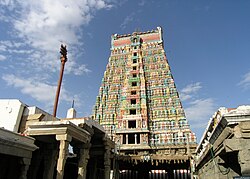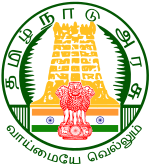
Srivilliputhur is a semi-urban town and a municipality in Virudhunagar district in the Indian state of Tamil Nadu. As of 2011, the town had a population of
75,396.Srivilliputtur is one of the old historical town, a 1000-year-old temple,
200-year-old Hindu School, 135-year-old Pennington Public Library are remarkable
historical evidence for this culturally important town. Thiruppavai, one of the important constituent of
devotional Tamil literature period was from this temple town.The remarkable landmark of Srivilliputhur is 11-tiered tower structure
dedicated to the Lord of Srivilliputhur, known as Vatapatrasayee. The tower of
this temple rises 192 feet high and is the official symbol of the Government of
Tamil Nadu. It is said to have
been built by Periyalvar,
believed to be the father-in-law of the Temple Deity, with a purse of gold that
he won in debates held in the palace of Pandya King
Vallabhadeva. Another wonder in Srivilliputtur is Chariot which runs on
AdiPuram. Srivilliputhur is well known for its ancient heritage and devotional
contributions.
History
The history of Srivilliputhur centres around the Srivilliputhur Temple, dedicated to
Andal (8th century or earlier), the only female
Alvar of the 12 Alvar saints of South India. She is credited with the Tamil works of Thirupavai and Nachiar Tirumozhi
that are still recited by devotees during the Winter festival season of Margazhi. Andal is
known for her unwavering devotion to god Vishnu, the God of the Srivaishnavas. Adopted by her
father, the Alvar saint Periyalvar who found her as a baby, Andal avoided
earthly marriage, the normal and expected path for women of her culture, to
"marry" Vishnu, both spiritually and physically. In many places in India,
particularly in Tamil Nadu,
Andal is treated more than a saint and as a form of god herself and a shrine for
Andal is dedicated in most Vishnu temples.
During the reign of Thirumalai Naikar (1623–1659) and Rani Mangammal (1689–1706), this city
became very popular. Thirumalai Nayak renovated the temples of this city. Nayak
built a palace similar, but smaller in size to that of Thirumalai Nayakkar Palace in
Madurai. Entry to this well preserved historical complex is presently restricted
by the Archaeological Department of India which is managing this palace
complex. From 1751 to 1756
A.D., Srivilliputhur came under the rule of Nerkattumseval palayakkarar Puli thevar and was a maravarpalayam. Later the Fort of
Srivilliputtur was ruled by Periyasami Thevar. Then it fell into
the hands of Mohammed Yusuf Khan during 1756. The troops of Yusuf won over the
Polygars in the region. When they tried to invade Srivilliputhur, a Brahmin fell from the top of the temple
tower as a mark of protest. Though Muslims, the troops retreated at the sight of
the shattering brain in front of a Hindu temple might draw further wrath.During 1801, there
were battles between polygars in the region and the British. One of the rebels,
Sivattaiya Nayak was captured in the town during the same year. During February
1811, the town was suffering from an epidemic. Until 1850, Sri
Andal temple was under the care of the king of Trivancore. The British ruled the
country till India attained freedom in 1947.


No comments:
Post a Comment